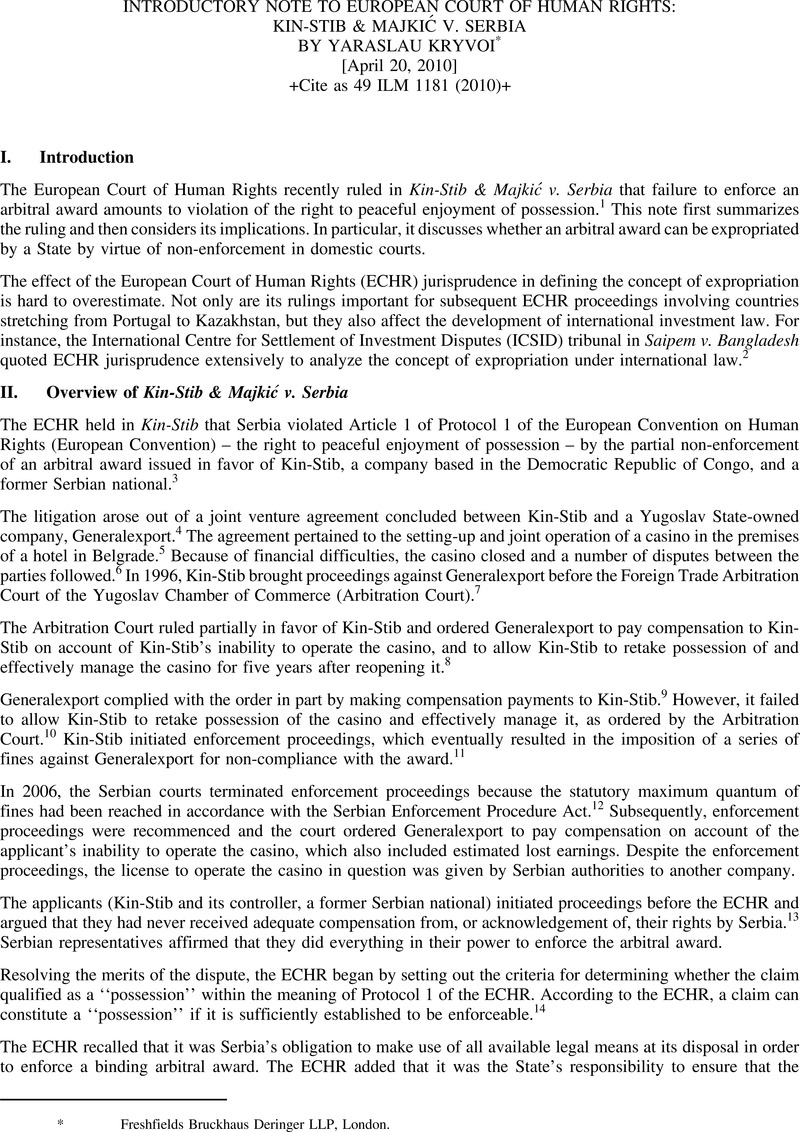Published online by Cambridge University Press: 27 February 2017

* This text was reproduced and reformatted from the text available at the European Court of Human Rights website (visited June 1, 2010) http://cmiskp.echr.coe.int/tkp197/view.asp?action=html&documentId=866680portal=hbkm&source=externalbydocnumber&table=F69A27FD8FB86142BF01C1166DEA398649.
1 Kin-Stib & Majkić v. Serbia, App. No. 12312/05 (Eur. Ct. H.R. 2010).
2 Saipem S.p.A. v. People’s Republic of Bangladesh, ICSID Case No. ARB/05/07, Decision on Jurisdiction&Recommendation on Provisional Measures (Mar. 21, 2007).
3 The European Convention entitles corporate bodies – in addition to humans – to invoke Article 1 of the Protocol 1. This is clear from the wording of Article 1: “Every natural or legal person is entitled . . . “
4 Kin-Stib&Majkić,App. No. 12312/05, ¶ 7.
5 Id. ¶ 7
6 Id. ¶ 10.
7 Id. ¶¶ 11-12.
8 Id. ¶ 12.
9 Id. ¶¶ 14-20.
10 Id.
11 Id. ¶ 22.
12 Id. ¶ 23.
13 Id. ¶ 24.
14 Id. ¶ 83 (citing Burdov v. Russia, App. No. 59498/00, ¶ 40, 2002-III Eur. Ct. H.R.).
15 Id. ¶ 83 (citing Marcĭcć v. Serbia, App. No. 17556/05, ¶ 56 (Eur. Ct. H.R. 2007)).
16 Id. ¶ 85
17 Id. ¶¶ 95-96.
18 Id
19 See, e.g., Allard v. Sweden, App. No. 35179/97, 2003-VII Eur. Ct. H.R. (June 24, 2003).
20 See Saipem, ICSID Case No. ARB/05/07, ¶ 133.
21 Universal Declaration of Human Rights art. 17, G.A. Res. 217 (III) A, U.N. Doc. A/RES/217(III) (Dec. 10, 1948)
22 Sporrong&Lo¨nnroth v. Sweden, A52 (Eur. Ct. H.R. 1982) (one of the most important decisions under Article 1 of Protocol 1 of the European Convention).
23 See, e.g., Phillips Petroleum Iran v. Islamic Republic of Iran&Nat’l Iranian Oil Co., Case No. 39, Award No. 425-39-2 of June 29, 1989, Y.B. Comm. Arb., vol. XVI, at 289-321, ¶ 75 (Iran-U.S. Cl. Trib. 1991); S. Pac. Prop. (Middle East) Ltd. v. Arab Republic of Egypt, Award&Dissenting Opinion of May 20, 1992, 32 I.L.M. 1470 (1993).
24 Saipem, ICSID Case No. ARB/05/07, ¶ 127 ( “[t]he rights embodied in the [arbitration] Award were not created by the Award, but arise out of the Contract. The [arbitration] Award crystallized the parties’ rights and obligations under the original contract. “).
25 See H. Ruiz Fabri, The Approach Taken by the European Court of Human Rights to the Assessment of Compensation for “Regulatory Expropriations of the Property of Foreign Investors, 11 N.Y.U. Envtl. L. J. 148 (2002).
26 Saipem, ICSID Case No. ARB/05/07, ¶ 133.
27 George Christie, What Constitutes a Taking of Property under International Law?, British Yearbook of International Law 307-338 (1962); see also OECD, “Indirect Expropriation “ and the “Right to Regulate “ inInternational Investment Law 10-14 (2004).
28 Stran Greek Refineries&Stratis readis v. Greece, 19 E.H.R.R 293 (1995).
29 Id. ¶ 61.
30 Article 54(1) of the ICSID Convention deals with enforcement and execution mechanisms: “Each Contracting State shall recognize an award rendered pursuant to this Convention as binding and enforce the pecuniary obligations imposed by that award within its territories as it were a final judgment of a court in that State. “
31 United Nations Convention on the Recognition and Enforcement of Foreign Arbitral Awards art. I (June 10, 1958).
32 Id.
33 Id. arts. III-IV.
34 See id. art. V (providing for a number of grounds such as failure to give proper notice and violation of public policy of the enforcing country).